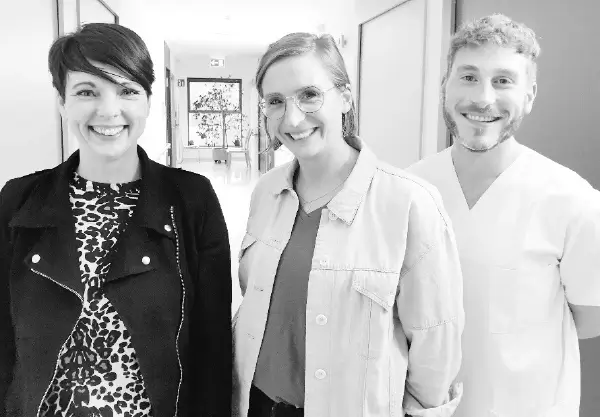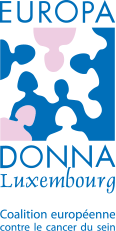Project 20 interviews
«Professionals speak about their daily work and their missions»
Interview with Madam Laurie Mathay responsible for the psycho-social at Centre of
Rehabilitation Physical and Post-Oncological in Colpach.
Laurie Mathay is a nurse, specialized in community health. This is a field that focuses on a holistic health approach, allowing life situations to be explored, to identify the determinants of health, to analyze interdependance, to accompany patients in an interdisciplinary way during treatment and for a return to active life. Laurie works with the United Health Group, an association which promotes community health in Europe, and with the Luxembourg group of caregivers specialized in oncology (G.S.O).
Since 2008, she has contributed to developing a psycho-social approach at the National Centre of Convalescence (CRCC) in Colpach. In April 2018, she became responsible for the psycho-social service at this centre, which today is at the heart of physical and post-oncologic rehabilitation. Together with all the other professionals, Laurie focuses on developing the interdisciplinary project.
Laurie believes in integrative medicine (IM), a healing-oriented medicine, that takes into account the whole person, including all aspects of lifestyle. She is convinced that IM has its place in health centres, especially in a rehabilitation one (integrating all treatment practices coming from conventional and complementary medicine. All this is being evaluated scientifically on its safety and efficiency. The ultimate goal of this personalized care is to improve the global health of the patient, as well as physically and psychologically such as a better quality of life, reconnecting with one’s personal resources and to be in charge of one’s health.
In health centres, complementary support practices have been added to conventional medicine for some years. More and more, reports and publications confirm the positive part that complementary therapies, such as sophrology, hypnosis, meditation, massage, tailored physical activity play. All are excellent strategies to manage stress, anxiety, trauma, to revitalize, to manage pain, and improve the quality of life in general.
Within the framework of Laurie’s thesis, in her final exam in integrative health entitled: “Qualitative exploration of the impact of mind-body practices on the integrative approach at a rehabilitation centre”, she also highlighted the positive impact of all these practices on the improvement of quality of life of patients in rehabilitation centres.
It should be noted that on the basis of an admission request made by their doctor, patients affiliated to the CNS can benefit from a 30-day rehabilitation stay within the hospital, and up to 10 days as day patients. If a patient is not in the CNS, requests can be made to their own health insurance company.
The CRCC is located in a beautiful cultural environment within a park. All rooms are single and in addition they receive 24-hour care provided by professionals. Cancer patients or those who have chronic and/or acute diseases are assessed on entry, focusing on their overall health, and will be offered a personal care plan, which includes both conventional and complementary care, individual and group activities, and educational workshops.
– Specialised physiotherapists are on hand to help patients manage lymphoedemas, to recover tissue tropism and to improve scarring, to work on pain management and body image, individually and globally, to regain muscle strength and physical condition, etc.
– Occupational therapists provide patients with help to combat fatigue, to manage peripheral neuropathy better (which often presents after treatment), to receive technical aid to facilitate daily activities and a return to work again.
– Therapists trained in tailored physical activities, thanks to personalized programs, can offer walking, jogging, Pilates sessions, Swissball, etc., all while stressing the importance of physical activity during and after treatment.
– Then speech therapists are available to work on difficulties related to the mouth and throat area, and helping patients to regain their sense of taste, which might have been altered following chemotherapy.
– Dieticians can offer individual or group advice depending on the problem, such as culinary workshops, specific lessons on nutrition during and after treatment, etc.
– Caregivers specialized in certain areas (stomas, open wounds, diabetes, side effects of oncological treatments, etc.) offer specific lessons that can help patients to manage daily life better and to prevent other possible problems.
– The doctors (General Practitioners and specialists) also care for patients during their stay in an interdisciplinary manner, adapting treatment, if necessary, etc.
– Social support meets the needs of patients and their families, to advise them on their post-rehabilitation projects, and to take the necessary steps to ensure that these projects are implemented such as a return to work and a return to daily life, re-establishment of social rights, home help, including links with associations, etc.
– The psycho-social team also collaborates with the external key players in the field of oncology, such as Europa Donna, the Cancer Foundation, La Violette, Omega 90, the oncology sports group, hospitals, care networks, retirement homes, and administrative services.
– In addition, psychological support provides attentive listening to the patient, an analysis of the here and now situation, and a search for a solution in a collaborative way.
– Then neuropsychological support carries out the possibility of conducting specific assessments, and the solutions and tools to deal with the difficulties that might be encountered such as memory loss and concentration problems.
Patients on arrival and according to their objectives, are offered various treatments which are organized by care workers specifically trained in the various fields. These include a series of psycho-bodily practices aimed at expressing desires and emotions, the activation of personal resources, better vitality, better self-image, improvement of sleep quality and sensations of discomfort, and release of tension by learning muscular relaxation, such as sophrology; hypnosis; EMDR (Eye Movement Desensitization and Reprocessing) ; socio-aesthetic advice and care, including image advice and teaching related to secondary effects on the skin of the hands and feet, as well as hair and nails ; art therapy (dance, singing, plastic arts) ; mindfulness meditation which follows a path through Colpach park castle, thanks to a donation from Europa Donna, and a team from the Erasmus hospital in Brussels ; wellness massages ; advice on sex and intimacy ; relaxation via virtual reality.
This multidisciplinary care can benefit the patient as a self-care tool following a stay at the CRCC to help gradually regain body-mind balance and energy, and so a return to social and active life in the best possible way.
Message from the team:
“Cancer disrupts and alters the quality of life. Our integrative approach to health as proposed at the CRCC is an opportunity to get back in touch with oneself, to become aware of the importance of regaining body-mind balance, better vitality, and tolerance of treatment, reconnecting with one’s personal resources such as learning to live again, finding essential points of reference for overall fulfilment, and reaching one’s full potential. “
Practical advice:
A request for admission must be made to the CRCC through your doctor, your referral doctor or your oncologist. The application form is available from hospitals or on the CRCC website (www.rehabilitation.lu).
After approving this request, the CRCC will contact you or your doctor to arrange the best admission date. Finally, a confirmation letter will be sent, specifying the admission conditions.
In principle, if you come through the CNS, you will not have to take any other steps. The CRCC will ensure that you are covered by the CNS or your personal health system.
Thank you, Laurie, for your dedication, and that of your team.

From left to right: Laurence Aernouts (head of hospitalisation), Laurie Mathay, Maxime Dierickx (head of technical platform).
The interview was conducted by Ms. Françoise Hetto-Gaasch, member of the committee of Europa Donna Luxembourg.
Europa Donna Luxembourg Asbl
1b rue Thomas Edison L-1445 Strassen
Tél. : 621 47 83 94
E-mail : europadonna@pt.lu
